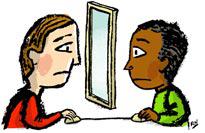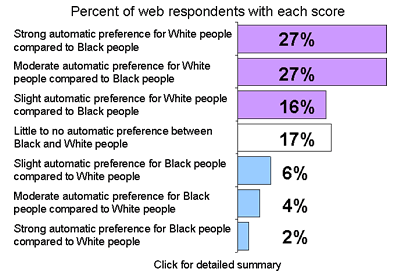How do you test internal bias? You can try asking people, but since most of us don't like to think of ourselves as biased, we won't necessarily admit to it on a questionnaire, even anonymously. But there's a test to detect the kind of bias people won't admit to and may not even be aware of themselves—a test that works. The psychologists who devised it, however, are squeamish about real-world uses of it. They shouldn't be. Though it shouldn't be used as the basis for hiring decisions, the test has its place.
In 2003, Mahzarin Banaji, Anthony G. Greenwald, and Brian Nosek published a paper detailing an experimental methodology they had developed called the Implicit Association Test, or IAT. Rather than asking subjects what they thought about different races (or what they thought they thought), Banaji and her colleagues decided to time them as they paired words and images.
In the test's most popular version, the Race IAT, subjects are shown a computer screen and asked to match positive words (love, wonderful, peace) or negative words (evil, horrible, failure) with faces of African-Americans or whites. Their responses are timed. If you tend to associate African-Americans with "bad" concepts, it will take you longer to group black faces with "good" concepts because you perceive them as incompatible. If you're consistently quicker at connecting positive words with whites and slower at connecting positive words with blacks—or quicker at connecting negative words with blacks and slower at connecting negative words with whites—you have an implicit bias for white faces over those of African-Americans. In other words, the time it takes you to pair the faces and words yields an empirical measure of your attitudes.
The elegance of Banaji's test is that it doesn't let you lie. What's being measured is merely the speed of each response. You might hate the idea of having a bias against African-Americans, but if it takes you significantly longer to group black faces with good concepts, there's no way you can hide it. You can't pretend to connect words and images faster any more than a sprinter can pretend to run faster. And you won't significantly change your score if you deliberately try to slow down your white = good and black = bad pairings.
Banaji, now a social psychologist at Harvard, has found that 88 percent of the white subjects who take her test show some bias against blacks. The majority of all subjects also test anti-gay, anti-elderly, and anti-Arab Muslim. Many people also exhibit bias against their own group: About half of blacks test anti-black; 36 percent of Arab Muslims test anti-Arab Muslim; and 38 percent of gays show an automatic preference for heterosexuals. (You can take the test yourself here; the results can be deeply humbling.)
The IAT, then, is an objective measure of bias. And research has shown that the test is powerfully predictive of behavior—as Banaji notes in refuting critics' claims that the test measures not individual bias but awareness of bias within society. People with high racial bias scores are more likely to choose a white partner to work with and more willing to cut funding for minority student groups. They're also more likely to judge minority suspects guilty in ambiguous situations and assign longer prison sentences to suspects with minority names.
In 2003, Mahzarin Banaji, Anthony G. Greenwald, and Brian Nosek published a paper detailing an experimental methodology they had developed called the Implicit Association Test, or IAT. Rather than asking subjects what they thought about different races (or what they thought they thought), Banaji and her colleagues decided to time them as they paired words and images.
In the test's most popular version, the Race IAT, subjects are shown a computer screen and asked to match positive words (love, wonderful, peace) or negative words (evil, horrible, failure) with faces of African-Americans or whites. Their responses are timed. If you tend to associate African-Americans with "bad" concepts, it will take you longer to group black faces with "good" concepts because you perceive them as incompatible. If you're consistently quicker at connecting positive words with whites and slower at connecting positive words with blacks—or quicker at connecting negative words with blacks and slower at connecting negative words with whites—you have an implicit bias for white faces over those of African-Americans. In other words, the time it takes you to pair the faces and words yields an empirical measure of your attitudes.
The elegance of Banaji's test is that it doesn't let you lie. What's being measured is merely the speed of each response. You might hate the idea of having a bias against African-Americans, but if it takes you significantly longer to group black faces with good concepts, there's no way you can hide it. You can't pretend to connect words and images faster any more than a sprinter can pretend to run faster. And you won't significantly change your score if you deliberately try to slow down your white = good and black = bad pairings.
Banaji, now a social psychologist at Harvard, has found that 88 percent of the white subjects who take her test show some bias against blacks. The majority of all subjects also test anti-gay, anti-elderly, and anti-Arab Muslim. Many people also exhibit bias against their own group: About half of blacks test anti-black; 36 percent of Arab Muslims test anti-Arab Muslim; and 38 percent of gays show an automatic preference for heterosexuals. (You can take the test yourself here; the results can be deeply humbling.)
The IAT, then, is an objective measure of bias. And research has shown that the test is powerfully predictive of behavior—as Banaji notes in refuting critics' claims that the test measures not individual bias but awareness of bias within society. People with high racial bias scores are more likely to choose a white partner to work with and more willing to cut funding for minority student groups. They're also more likely to judge minority suspects guilty in ambiguous situations and assign longer prison sentences to suspects with minority names.
On the one hand, I think this test is total bull****. I fail to see how simply matching faces and words together will allow for the determining of a person's "internal bias." I certainly don't believe it's an "objective measure of bias" or a powerful predictor of behavior.
On the other hand, I took the test and came out with a slight preference for African-Americans. God knows I am loathe to pass up a chance for smug self-congratulation and proof that I'm not racist is a socially acceptable excuse to engage in it.
So, is it ok if I gloat about proving my moral superiority on race issues in a test that I think is a crock? Or should I have just kept quiet about my noble views on race in the interest of intellectual honesty?
You guys should also feel free to take the test. A few of you may even prove to be as enlightened as I am...





Comment